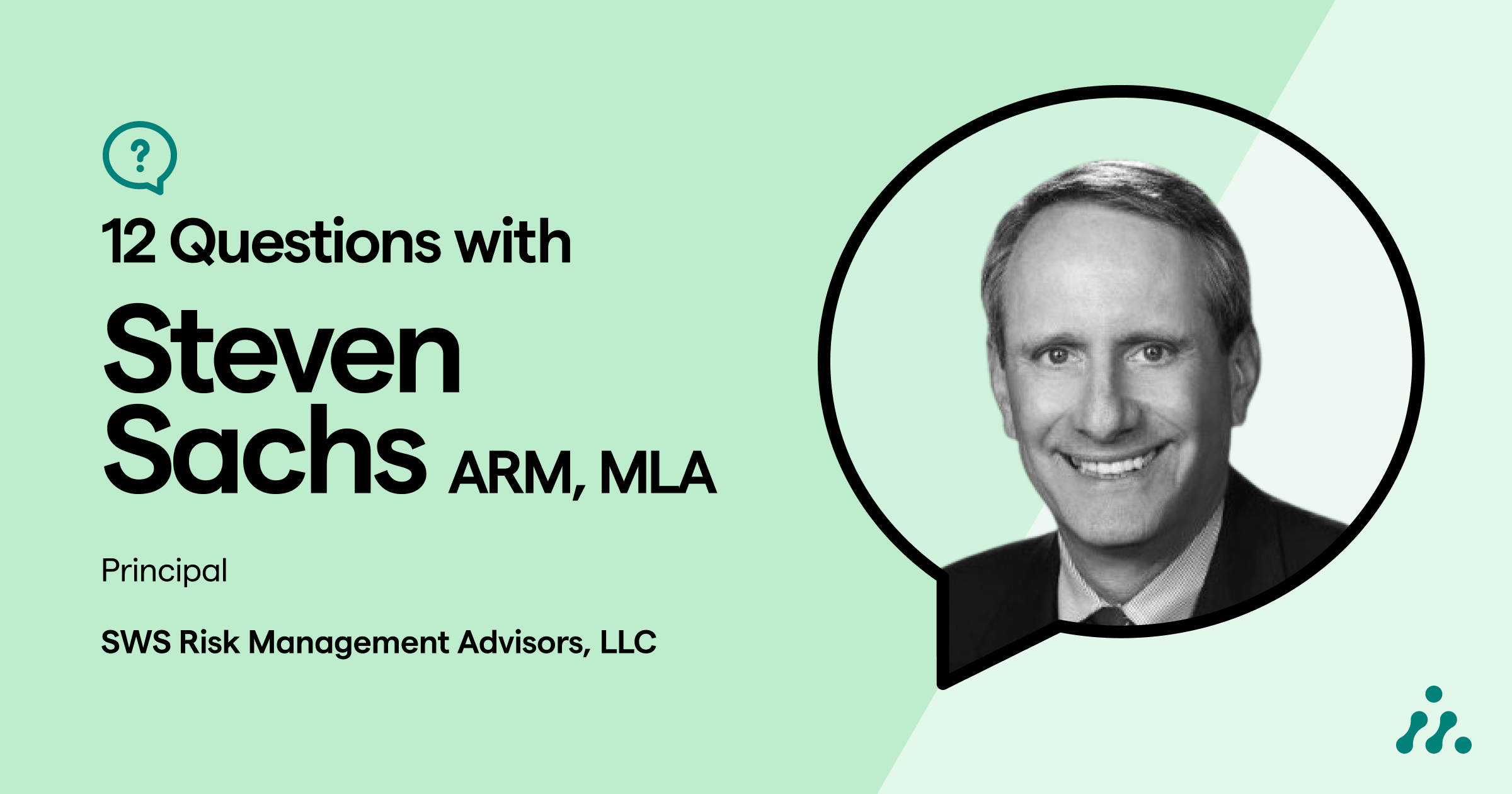12 Qs with Victor J. Sordillo, EVP, Global Director Risk Control at Sompo
12 Questions with Victor J. Sordillo
Welcome to 12 Questions, a Q&A series where we pose the same set of 12 questions to intriguing folks at the intersection of insurance, risk management, commercial real estate, and digital innovation.
Suggest someone we should feature next.
This week, we chat with Victor J. Sordillo, EVP, Global Director of Risk Control Services, Sompo International Insurance.
1. What is the most interesting idea you’ve encountered in your world lately?
Parametric Insurance fascinates me because I find it very innovative. Unlike other insurance products which indemnify an actual loss, parametric products cover the probability of a predefined event happening. While natural catastrophes or weather events are the most prevalent triggers, market indices, crop yield and even power outages, including renewables, could also be triggering events.
Considering the impact of climate change, the ability to predict and insure against a weather event is intriguing. For example, commercial property owners can insure against snow removal costs, or a ski lodge can insure against a lack of snow days.
Parametric products are intended to complement conventional insurance programs, not replace them. Coverage is based on the event occurring, not on the losses, so there’s no need to prove damages and the claims process is fast and straightforward. I find it interesting that you have to pre-determine your needs, factoring in the extra expenses of business interruption and supply chain issues, in addition to the potential property damage. These products are great examples of how insurers are developing solutions to protect clients against future events.
2. Where do you think no one is looking right now?
Many insurance companies talk about emerging hazards but are still studying asbestos and surgical mesh. At Sompo International, we're looking at emergent perils, meaning we're monitoring reports on risks, such as cancer clusters, with an eye on their origin and future impact. My team has alerts set up on different sites that will let us know whether the CDC or FDA has complaints or if the NFPA is seeing a string of unusual fires because of a type of plastics being used. Other people are only examining existing hazards and predicting losses based on that knowledge. What we're doing is preparing for the unknown in order to help our clients manage tomorrow’s risks. We're not examining asbestos; we’re predicting the next asbestos.
3. If you had a magic wand, what would you change about your industry?
That's an easy one, and anyone who's worked in this industry knows what it is – our industry’s negative perception. Insurance companies are not the bad guys. Our goal is to provide our clients with the best solutions to help them manage their risks, today and into the future. At Sompo International, our focus is on building relationships and long-term partnerships. We’re working closely with our clients to understand their business and developing solutions that address their specific challenges.
4. What’s the most rewarding part of what you do?
First and foremost, it’s preventing injuries, and then preventing property damage. Working in risk control gives you the satisfaction of knowing that you're contributing to something bigger. When a building doesn’t burn down and its occupants remain safe, we know we have played a critical role. You feel it when you're visiting a client and you're successful in getting them to comply with safety recommendations or best practices.
5. What do you envision the next 12 months will bring?
If you had asked me that question six months ago, I would have said that the pandemic would be over and we'd be back to a pre-Covid-19 way of life. However, as much as I hate to say this, this is going to be a slow recovery process. I think that there's tremendous pent-up demand for travel and face-to-face contact. I believe the world and its industries are going to slowly and unevenly reopen in an effort to reduce another surge and/or variant. So, we may have to deal with the effects of Covid-19 for the next 12 months, but I’m hopeful that by next Spring things will have normalized – whatever that means moving forward.
6. What’s your favorite building?
Since the first time I went there with my children, my favorite building has been Cinderella’s Castle at Disney World. When you go through those gates and you see that place, you think you're in heaven.
I’m also amazed by the Steinway Tower, a pencil tower on 57th Street in New York. As a structural engineer by education, I find it staggering that they can build something so thin and so tall. Yes, I know, two very different ends of the architectural spectrum!
7. Please dispel a myth or misconception about your work.
I think a lot of people think of us as risk managers, but we’re more than that. We are risk control specialists and our job is to analyze risk. Our process starts with looking for risk(s) and then analyzing each risk’s likelihood of causing a loss. Next, we develop recommendations on how to either mitigate the potential loss or eliminate it, and then we work with our clients to implement safety programs. We also maintain a library of intellectual capital, including safety checklists, specific to the industries that we support. These resources are shared with our clients to help them implement successful safety programs that make sense for their businesses.
8. What are the tools, apps, or gadgets that you just can’t live without?
Now that we're not traveling, I can't live without my laptop and my cell phone. That's how I conduct all my business these days. With the amount of Zoom and Webex calls I have every day, I could not be productive without either — I don't know how I'd even communicate!
9. What’s your biggest pleasant surprise related to remote work?
I get to see my family more, as I don't spend time commuting. Although I put in more hours, I see them sometimes at a lunch break or a coffee break. Or I just walk out to stretch my muscles, and I see my wife in the kitchen or my grandchildren, who drop by. Before the pandemic, I was traveling a lot, so the added time with my family is a pleasant surprise.
10. What’s your favorite productivity tip for staying motivated and getting work done?
For me, staying connected with colleagues and clients makes all the difference in the world. Strong, ongoing communication is imperative in the best of situations – add in a remote working environment and it becomes even more important. If we are working on a project or doing client work, we need to be in step with underwriting, claims, actuarial and operations at all times. You have to stay connected to people within your organization, both staff and customers. Remember, they don't see you much these days, so communication and even over-communication may be absolutely necessary to be successful.
11. What or who do you read/watch to keep informed?
I like to read novels on weekends and the last book I really enjoyed (except for the ending, which left me hanging) was John Grisham's A Time for Mercy. Maybe he's going to write a sequel – one can hope! My favorite business book is Risk Intelligence by Dylan Evans. In fact, I based a product and service that we offer now on it.
Another of my favorite books is Dave Eggers’ The Circle. It showed how Google or Facebook could dominate our lives in the future. It really projected an organization that took over our social, business, and political life. I recommend reading it; the movie doesn't come close.
12. Please nominate someone who should answer this next. Why?
Christine Sullivan, SVP Risk Control Director at Sompo Global Risk Solutions (GRS), would be my number one choice. She was my college intern from Tufts back in the late '80s and then came on board as a trainee. She's a brilliant, brilliant woman and successful both in her leadership role within Sompo GRS (Global Risk Solutions) and beyond it; she's going to be the next President of the American Society of Safety Professionals, the largest safety organization in the world.
Thank you to Phil LeGrone, Director of Product Strategy at Archipelago, for interviewing Victor.
Suggest someone we should feature next.
Share this
You May Also Like
These Related Stories

12 Qs with Christine Sullivan, SVP, Risk Control Director at Sompo

12 Qs with Alexandra Glickman, SMD, Real Estate & Hospitality at Gallagher
